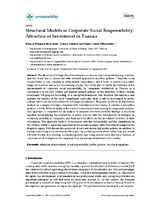Structural Models in Corporate Social Responsibility: Attraction of Investment in Tunisia
Autor
Bousselmi, Hosn el Woujoud
Caridad y López del Río, Lorena
Ceular Villamandos, Nuria
Editor
MDPIFecha
2019Materia
Attraction of investmentSocial responsibility
Public policies
Structural equations
METS:
Mostrar el registro METSPREMIS:
Mostrar el registro PREMISMetadatos
Mostrar el registro completo del ítemResumen
The attraction of foreign direct investment is a common objective in developing countries, and this broad aim is carried out with different approaches in public policies. Corporate social responsibility is very common in international corporations, and it tends to produce a positive image for investors and in the surrounding society. This study aims to clarify the influence of the enhancement of corporate social responsibility by companies established in Tunisia as a consequence of the host country government general policies on the attraction of direct foreign investment. We propose the testing of a conceptual framework that describes this influence and explains the benefits of the social commitment, especially when it will be encouraged by public policies which can favor the attraction of foreign investments. The paper opted for an exploratory analysis on a sample of foreign companies with subsidiaries in the country. It contains a descriptive analysis, a study of the reliability of the scales of measurement and a principal components analysis. This approach is completed by an analysis of moment structures (AMOS) through a structural equation model linking the interactions of public policies with the development of strategies in social responsibility in companies, and their induced effects on the investment decisions in their subsidiaries. This approach tends to be associated with the sustainability and the commitment in the country, which is especially important in the present moment, with the political changes in the Maghreb region. With the models proposed, it has been shown that public policies, in addition to having a direct impact on investment decisions, can produce positive effects when they are carried out with the aim of promoting sustainable growth, and using indirect tools like the promotion of corporate social strategies in the companies that are already established in the country.

